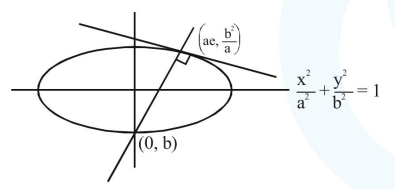Question:
If the normal at an end of a latus rectum of an ellipse passes through an extremity of the minor axis, then the eccentricity e of the ellipse satisfies :
Correct Option:
Solution:

$\frac{a^{2} x}{x_{1}}-\frac{b^{2} y}{y_{1}}=a^{2} e^{2}$
$\frac{a^{2} x}{a e}-\frac{b^{2} y}{b^{2}} \cdot a=a^{2} e^{2}$
$\frac{a x}{e}-a y=a^{2} e^{2} \Rightarrow \frac{x}{e}-y=a e^{2}$
passes through $(0, \mathrm{~b})$
$-b=a e^{2} \Rightarrow b^{2}=a^{2} e^{4}$
$a^{2}\left(1-e^{2}\right)=a^{2} e^{4} \Rightarrow e^{4}+e^{2}=1$
